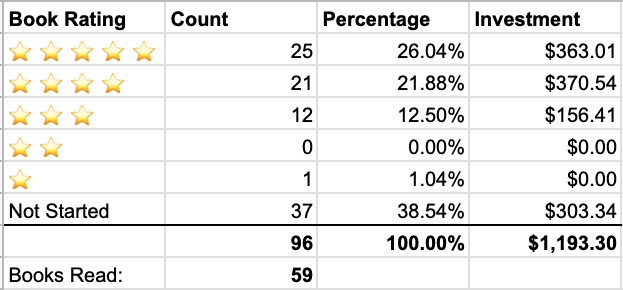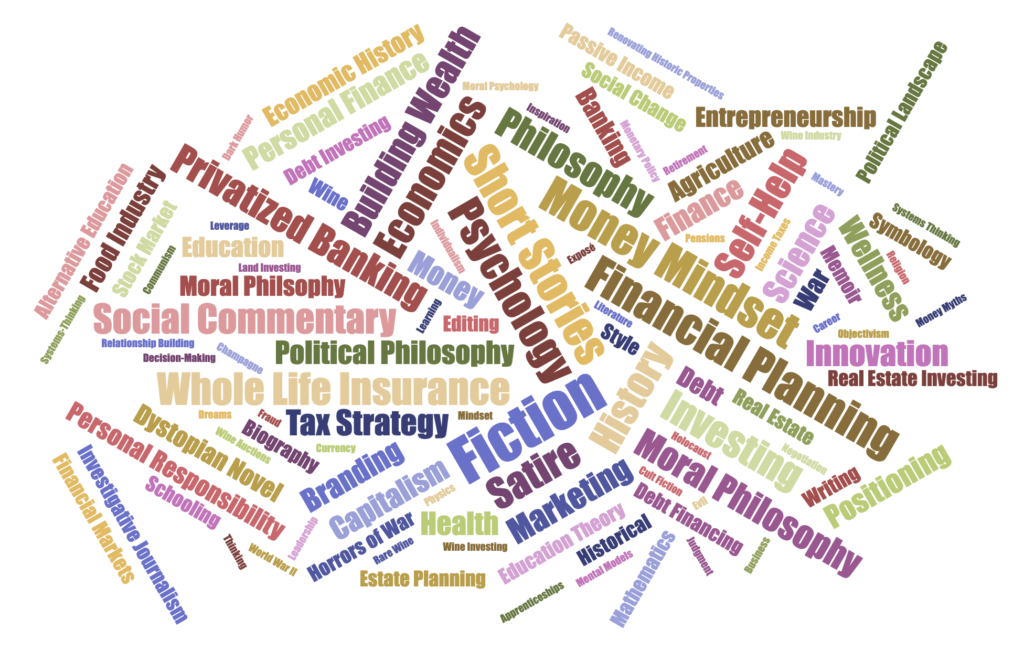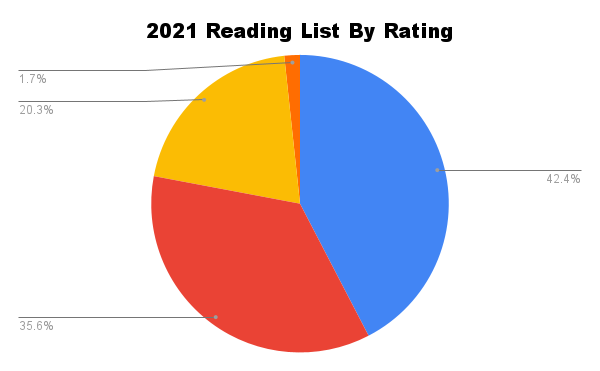We tasted many incredible wines this year. I keep a running catalog with pictures and notes from our favorites.
This year, I wanted to publicly share the simple version of this list with my quick ratings. I assigned each wine a score out of 10. I guess you could say my score represents how much I enjoyed. But more realistically, it’s a relative value of a particular wine versus my mental catalogue of other wines of the same varietal / type. To an extent, the circumstances of when and where we drank the wine likely also influence my score.
For example, when I score 2006 Dom Pérignon a perfect 10 out of 10, it’s worth noting that I opened this the night of our wedding. I searched for this particular vintage for months because my wife and I first met in 2006. This was also our first tasting of Dom Pérignon. We have since tasted the wine on two other occasions. We drank the 2006 again on our honeymoon, and drank the 2010 vintage this year after finishing the remodel of our house. The first tasting of 2006 was phenomenal. The second bottle of 2006 was not nearly as well preserved. By all means, it was still enjoyable, but likely closer to a 8-9 out of 10. The 2010 was also showing well, and remains among my top champagnes for the year.
I reconstructed this list more or less in the order which we drank the wines throughout the yet.
Okay, onward to the wines. (I will update this as we finish our remaining wine tastings for the year.)
Notable Wines from the List
A few exceptional wines stand out among the list, and these deserve a special additional note.
I already paid homage to the Dom Pérignon vintages.
We tasted through many other truly phenomenal champagnes, Bordeaux blends, burgundies, barolos, as well as a number of notable rieslings.
Top Champagnes & Bubbles:
When you can’t (yet) afford to drink Dom Pérignon, Cristal, or La Grande Dame every night, you’ve got to find a nice middle ground. Heading into 2021, our go-to champagne has been Moet & Chandon Imperial Brut for quite some time. But there are a couple new kids on the block.
In the “more affordable” category, may I introduce Schamsberg Blanc de Noirs. This beautiful blend of ~80% pinot noir and ~20% chardonnay is a sure crowd-pleaser. Especially when you consider the average retail price of $35-$40.
In the “Best under $100” category, I’ve got to go with Louis Roderer Estate Brut Premier. At an average retail price around $67, you probably won’t want to pop this baby every night. But the pure freshness, silky bubbles, vibrant flavor, inviting finish will leave you inventing special occasions to splurge. I’d also recommend Bollinger Special Cuvee, too, at a still slightly higher price point.
Top Bordeaux & Cabernet Sauvignon:
Anyone who knows me well knows how much of a sucker I am for “Magic Marker Reds” and we definitely hit our quota this year.
Many of these came from France, though a few American entries certainly snuck in.
It would be impossible to rank these in order. Instead, I’d recommend trying all of them yourself. 😉
- Château D’Issan Grand Cru Margaux 2015
- Alta Gracia Napa Valley Cabernet Sauvignon 2014
- Château de Lescours Saint-Emilion Grand Cru 2015
- Château La Tour De Mons Margaux
- Mira Napa Valley Cabernet Sauvignon 2013
- Caymus Vineyards Napa Valley Cabernet Sauvignon 2019
- Keenan Napa Valley Cabernet Sauvignon 2017
- Blackbird Vineyards Arise Bordeaux Blend 2015
- Chateau Rauzan-Segla Margaux 2015
- Barons de Rothschild Saint-Emilion Légende Bordeaux 2016
- O’Shaughnessy Napa Valley Cabernet Sauvignon 2018
- Château Malescot St. Exupéry Margaux 2018
- Château De Sales Pomerol Bordeaux 2018
- Justin Savant Red Blend 2018
- Johndrow Vineyards Napa Valley Forum Confidential Reserve 2006
- Justin Justification Red Blend 2016
- Stony Hill Cabernet Sauvignon 2015
Top Barolo:
We drank a lot more barbera and tuscan wine than we did barolo this year. But we made the most of the ones we did sneak into the list. Here are a few of the hits:
- Parusso Barolo 2014
- Damilano Lecinquevigne Barolo 2016
- Massolino Serralunga D’Alba Barolo 2015
- Pio Cesare Barolo 2016 (If picking something from piedmont intimidates you, Pio Cesare is an excellent, reliable top producer. Always a crowd favorite.)
- Guido Porro Barolo Vigna Lazzairasco 2015 (If I had to pick my top selection, this one takes the cake for the year.)
Top Burgundian / Beaujolais / Châteauneuf-du-Pape
If 2020 was the year I fell in love with burgundy, then 2021 was the year I ran away on a lover’s affair with it. We drank so many truly incredible wines from the region – and within a surprising budget, given Burgundy’s reputation for breaking the bank. Here are a few of those memorable selections (with a few other delightful wines from nearby regions thrown in for good measure):
- Gevrey-Chambertin Chanson Bourgogne 2016
- Henry Natter Sancerre
- Gevrey-Chambertin Magnien Premier Cru Cazetiers 2013 (<–this one was truly incredible, drank on our honeymoon)
- Chateau Fortia Châteauneuf-du-Pape Cuvée du Baron 2017
- Pierre-Marie Chermette Fleurie Poncié 2016
- Pierre-Marie Chermette Fleurie Les Garants 2017
- Aegerter Jean-Luc & Paul Bourgogne Pinot Noir Reserve
- Louis Latour Bourgogne Pinot Noir 2017 (Great value buy)
- Domaine Antonin Guyin Gevrey-Chambertin La Justice 2018 (<–also phenomenal)
- Louis Jadot Bourgogne Pinot Noir (Great value buy)
- Domaine Pierre Guillemot Savigny-les-Beaune Aux Serpentières Premier Cru 2018 (<–truly fantastic, drank for my 30th birthday)
- Charles Audoin Bourgogne 2016
- Louis Latour Les Pierres Dorées Pinot Noir
A Few Beautiful White Wines
After being forced to forego our trip to Alsace in 2020, Riesling and
Gewürztraminer were a touch on the bittersweet side. We did not venture as far into this region of the world as typical, but still tasted several delightful wines. The value-to-quality ratio for these wines is nearly unmatched. Here are a few I’d recommend:
- Holy Cross Abbey Winery Riesling (<–surprisingly good, especially for a wine made in Colorado)
- Alkoomi Franklin River Australia Riesling 2017
- Kuentz-Bas Alsace Riesling 2018 (<–one of my favorite rieslings, esp. for the price)
- Trefethen Oak Knoll District Napa Valley Dry Riesling 2020
- Domaine Specht Mandelberg Alsace Grand Cru Riesling
- Dönnhoff Riesling Nahe 2019 (<–exceptional)
- Trimbach Riesling & Gewürztraminer (<– these are two of my go-to wines, though I favor the Gewürztraminer)
The Top Wines I Tasted in 2021
This is by no means a comprehensive list, but I tried to include any wine that I would definitely drink again if given the chance. Then, of course, there are plenty of wines that did not make these list. Though I will say, I don’t think we encountered a single wine this year that was so bad we couldn’t finish it. Yay us.
Without further ado, here’s the entire list:
Moet & Chandon Imperial Brut 9/10
Gaston Chiquet Premier Cru Champagne 8/10
Veuve Clicquot Champagne 9/10
Dom Pérignon Champagne 2006 10/10
Château D’Issan Grand Cru Margaux 2015 10/10
Schramsberg Blanc de Blancs 7.5/10
Schramsberg Blanc de Noirs 8.5/10
Alta Gracia Napa Valley Cabernet Sauvignon 2014 9.5/10
Groth Napa Valley, Oakville Cabernet Sauvignon 2016 8/10
Gevrey-Chambertin 2016 Chanson Bourgogne 8.5/10
Henry Natter Sancerre 9/10
Gevrey-Chambertin Magnien 2013 Premier Cru Cazetiers 10/10
Belle Glos Pinot Noir Dairyman 7.5/10
Ripassa Valpolicella Ripasso Superiore 2013 7.5/10
HG III Napa Valley Proprietary Blend 2018 8/10
Erba Napa Valley Cabernet Sauvignon 2011 7.5/10
Château De Pizay Morgon 7.5/10
Holy Cross Abbey Winery Riesling 7.5/10
Château Fortia Chateauneuf-du-Pape Cuvée du Baron 2017 8/10
Alkoomi Franklin River Australia Riesling 2017 7.5/10
Pierre-Marie Chermette Fleurie Poncié 2016 9/10
Pierre-Marie Chermette Fleurie Les Garants 2017 9/10
Algodon Argentina Estate Pinot Noir 2015 8.5/10
Left Coast Cellars Blanc de Noir 8.5/10
Parusso Barolo 2014 8.5/10
Château de Lescours Saint-Emilion Grand Cru 2015 9.5/10
Blackbird Vineyards Arise Bordeaux Blend 2015 9.5/10
Aegerter Jean-Luc & Paul Bourgogne Pinot Noir Reserve 8/10
Louis Latour Bourgogne Pinot Noir 2017 9/10
Château La Tour De Mons Margaux 8.5/10
Mira Napa Valley Cabernet Sauvignon 2013 8.5/10
Bollinger Special Cuvee Champagne 9/10
Marques de Fiscal Rioja Reserva 7/10
Caymus Vineyards Napa Valley Cabernet Sauvignon 2019 8/10
Keenan Napa Valley Cabernet Sauvignon 2017 8.5/10
Poliziana Vino Nobile di Montepulciano 7.5/10
Veuve Clicquot La Grande Dame 2008 Champagne 9.5/10
Etude Estate Grown Pinot Noir 2018 7/10
Dom Pérignon Champagne 2010 10/10
Hearst Ranch Winery Cabernet Franc 7/10
Bussi Piero Barbera D’Astia Superiore 7.5/10
Louis Roederer Cristal Champagne 2009 10/10
Chateau Rauzan-Segla Margaux 2015 10/10
Domaine Antonin Guyin Gevrey-Chambertin La Justice 2018 10/10
Louis Jadot Bourgogne Pinot Noir 8.5/10
Damilano Lecinquevigne Barolo 2016 8.5/10
Le Cigare Volant 2018 7/10
Louis Jadot Beaujolais-Villages Gamay 7/10
Barons de Rothschild Saint-Emilion Légende Bordeaux 2016 9/10
Massolino Serralunga D’Alba Barolo 2015 8.5/10
Banfi Rosso di Montalcino Chianti 2016 7.5/10
Nicolas Feuillatte Reserve Exclusive Brut 8.5/10
Louis Roederer Brut Premier Champagne 10/10
Domaine Pierre Guillemot Savigny-les-Beaune Aux Serpentières Premier Cru 2018 10/10
Pio Cesare Barolo 2016 10/10
O’Shaughnessy Napa Valley Cabernet Sauvignon 2018 10/10
Kuentz-Bas Alsace Riesling 2018 8.5/10
Trefethen Oak Knoll District Napa Valley Dry Riesling 2020 8/10
Louis Roederer Collection 242 Champagne 9/10
Charles Audoin Bourgogne 2016 8/10
Château Malescot St. Exupéry Margaux 2018 10/10
Château De Sales Pomerol Bordeaux 2018 8.5/10
Champagne J. Lassalle “Preference” Premier Cru 8.5/10
Justin Savant Red Blend 2018 10/10
Domaine Specht Mandelberg Alsace Grand Cru Riesling 9/10
Veuve Clicquot Rosé Champagne 9/10
Johndrow Vineyards Napa Valley Forum Confidential Reserve 2006 9.5/10
Louis Latour Les Pierres Dorées Pinot Noir 9/10
Justin Justification Red Blend 2016 9.5/10
Guido Porro Barolo Vigna Lazzairasco 2015 9.5/10
Dönnhoff Riesling Nahe 2019 8.5/10
Stony Hill Cabernet Sauvignon 2015 9/10


